Study Neuroscience at Maine’s Leading Health University
Become an explorer in one of medicine’s final frontiers: the brain. UNE’s Neuroscience major combines hands-on discovery, research, and internships to bring you an interdisciplinary program incorporating the fields of psychology, biology, chemistry, and biomedical science. Ranked a “High Research Activity” university by the Carnegie Classification, you will work with field-leading faculty members and state-of-the-art resources you would expect at a large institution. You will also experience the benefits of a small, intimate college environment that gives you the one-on-one attention and access to sophisticated equipment that are usually only offered at the graduate level. Visit our blog to read more about the class experiences, internships, activities, and accomplishments of our Neuroscience students and faculty.

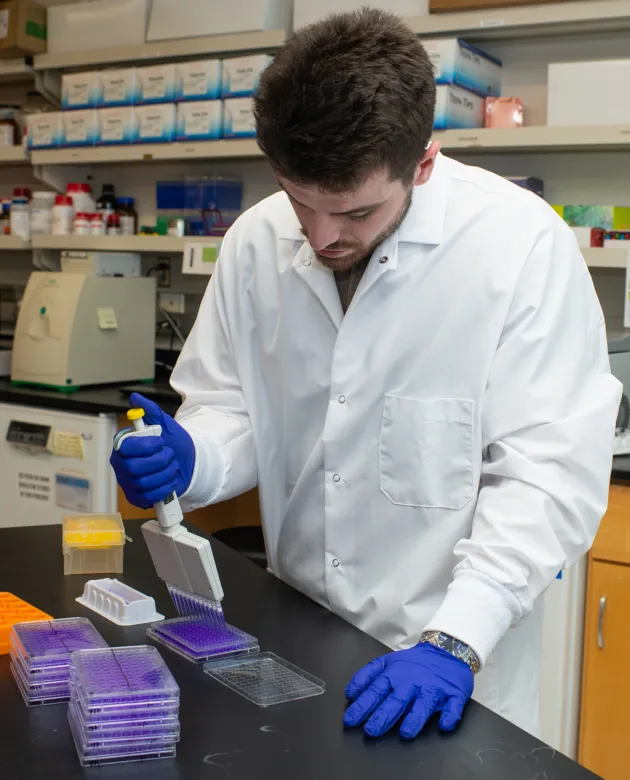
Why UNE for your B.S. in Neuroscience
With our uncommon breadth of research opportunities for undergraduates, you’ll have opportunities to work on research funded by the NIH, NSF, and top tier foundations. From participating in experiment design to publishing your results as co-author, you will get graduate-level experience as an undergraduate student.
- Mentorship from nationally and internationally known faculty from across UNE colleges, including our College of Osteopathic Medicine
- Robust internship program
- Neuroscience Summer Scholars program
- Weekly seminar series with world-renowned speakers
- Hands-On outreach in K-12 schools and at annual Brain Fair
- Active Neuroscience Club
What Will You Study? Neuroscience Degree Curriculum Overview
In your second two years, you may choose to focus on cellular/molecular neurobiology, behavioral neuroscience, or cognitive science.
B.S. in Neuroscience Courses
The following are some examples of the exciting courses that you can take:
- Neuroscience Internship
- Medical Neuroanatomy
- Introduction to Neurobiology
- Behavioral and Cognitive Neuroscience
- Neurobiology of Mental Illness
By choosing the Pre-Med/Pre-Health Professions track of the Neuroscience major, you can complete all prerequisite coursework for graduate study in medicine, physician assistant, occupational therapy, and physical therapy.
Curriculum
| CAS Core Requirements | Credits |
|---|---|
| Total Credits | 43 |
| Program Required Courses | Credits |
|---|---|
| BIO 105/105L – Bio I: Ecology/Evolution w/Lab | Credits Fulfilled by Core Requirements |
| BIO 106/106L – Biology II: Cellular/Molecular w/Lab | 4 |
| CHE 110/110L – General Chemistry I w/Lab or CHE 150/150L – University General Chem I w/Lab | 4 |
| CHE 111/111L - General Chemistry II w/Lab or CHE 151/151L – University General Chem II w/Lab | 4 |
| CHE 210/210L/210S – Organic Chemistry I w/Lab and LabLecture | 5 |
| CHE 211/211L/211S – Organic Chemistry II w/Lab and LabLecture or CHE 310/310L – Fundamentals of Biochemistry w/Lab | 4–5 |
| MAT 190 – Calculus I | Credits Fulfilled by Core Requirements |
| NEU 205/205L – Intro to Neurobiology w/Lab | 4 |
| NEU 300 – Neuroscience Internship or NEU 495 – Neuroscience Lab Research | 3–12 |
| NEU 306/306L – Behavioral/Cognitive Neuro w/Lab | 4 |
| NEU 410 – Neurobiology of Mental Illness | 3 |
| PHY 110 – General Physics I | 4 |
| PHY 111 – General Physics II | 4 |
| PSY 105 – Introduction to Psychology | 3 |
| PSY 225 – Psychology Statistics or MAT 150 – Statistics for Life Sciences | 3 |
| PSY 250 – Lifespan Development in Context | Credits Fulfilled by Core Requirements |
| Three (3) required electives taken from List A and B. No more than two (2) may be chosen from either list A or B. | 9–13 |
| Total credits | 58–72 |
| Open elective courses (as needed to reach 120 credits) | Variable |
| Minimum Total Required Credits | 120 |
|---|
| List A | Credits |
|---|---|
| BIO 214 /214L – Genetics w/Lab | 4 |
| BIO 245/245L – General Principles of Anatomy, Physiology, and Pathophysiology I w/Lab | 4 |
| BIO 322 – Comparative Animal Physiology | 3 |
| BIO 330/330L – Comparative Vertebrate Anatomy w/Lab | 4 |
| BIO 340 – Biology of Sex & Gender | 3 |
| BIO 345/345L – General Principles of Anatomy, Physiology, and Pathophysiology II w/Lab | 5 |
| BIO 365 – Immunology | 3 |
| BIO 370 – Cell and Molecular Biology | 3 |
| BIO 407 – Developmental Biology | 3 |
| BIO 450 – Biology Topics (with program approval) | 3 |
| CHE 405 – Medicinal Chemistry | 3 |
| List B | Credits |
|---|---|
| PHI 370 – Philosophy of Psychology | 3 |
| PHI 380 – Philosophy of Mind | 3 |
| PSY 205 – Abnormal Psychology | 3 |
| PSY 226 – Motivation and Emotion | 3 |
| PSY 245 – Evolutionary Psychology | 3 |
| PSY 275 – Introduction to Techniques in Animal Behavior | 3 |
| PSY 285 – Research Methods | 3 |
| PSY 290 – Developmental Psychopathology | 3 |
| PSY 316 – Psychology of Consciousness | 3 |
| PSY 325 – Psychology of Aging | 3 |
| PSY 335 – Comparative Animal Behavior or BIO 335 – Animal Behavior/Behavioral Ecology | 3 |
| PSY 362 – Animal Cognition | 3 |
| PSY 364 – Social and Emotional Development in Childhood | 3 |
| PSY 370 – Drugs, Society, and Behavior | 3 |
| PSY 380 – Learning/Conditioning and Behavior Modification or PSY 384/ 384L – Animal Learning and Behavior w/Lab | 3–4 |
| PSY 383 – Memory and Cognition | 3 |
| PSY 425 – Advanced Methods in Animal Behavior | 3 |
Students in this major can participate in the pre-health graduate school preparation tracks.
To learn more about the program visit the Catalog.
Changes were made to this program in an addendum to the 2022/23 academic calendar. Please see the 2022–2023 Catalog Addendum (PDF) for the most recent information. As always, it is recommended that students seek the guidance of Academic Advisors for course and program planning. In this way, you will be able to access all the most up-to-date information available.
Medical and Other Health Care Preparation
If you are interested in attending medical school, a physician assistant program, or a graduate program in occupational or physical therapy, you can major in Neuroscience at UNE and fulfill all of the prerequisites for these programs. Find out more by visiting the Office of Pre-Health Professions Advising.
Meet our faculty and professional staff
Honors Program
We offer qualified students the option of graduating with Honors. This includes significant research, scholarship or creative activity under the direction of a faculty member. Interested students should consult with their advisor.
Contact
For more information contact Glenn Stevenson, Ph.D. at (207) 602-2285 or gstevenson@une.edu
Career Paths for Neuroscience Majors
With the research experience most undergraduates can only dream of, you will stand out to employers and graduate schools alike. Your robust knowledge, analytical skills, internship experience, and outreach service will stand you in good stead as you embark on your journey to success in the neuroscience field. Our Neuroscience majors may explore numerous careers, including:
- Neuroscientist (in academic, governmental, or industrial settings)
- Physician/Neurologist
- Neuropsychologist
- Consultant
- Scientific Writer
- Policy Advocate
- Biotechnician
Career Advising for B.S. in Neuroscience Students
Whether you have a specific career goal in mind or a vague idea of the field that interests you, Career Advising is here to help you plan your next step.
Facilities for B.S. in Neuroscience Students
As a Neuroscience student, you benefit from UNE's extraordinary resources.
Teaching Classrooms
We have dedicated teaching classrooms that allow you the opportunity to work closely with faculty and peers in hands-on activities.
Psychology Labs
In these spaces, you will have the opportunity to work on a variety of projects involving Psychology faculty members. Projects have included memory processes underlying reading comprehension, how explicit and implicit self and relationship processes influence how people navigate the ups and downs of daily life.
Neuroscience Labs
Our faculty members with expertise in the neurosciences have labs dedicated to their research into topics concerning learning and memory, cognition and development, psychopharmacology, and drug addiction and pain.
Animal Behavior Labs
In these labs, you have chances to work with faculty on a variety of research projects, such as ones investigating conservation genetics, wildlife conservation, and how pharmaceuticals, endocrine-disrupting chemicals, and other pollutants affect the behavior of the fish.
Centers for Excellence
Center for Excellence in Neuroscience
The Center for Excellence in the Neurosciences sponsors research opportunities for Neuroscience majors.
The Center organizes a Neuroscience Summer Scholars Program, supporting Neuroscience majors with their summer research projects.
Summer scholars attend the summer seminar series, which brings in researchers from around the world, and present their experimental results at a research fair held at the conclusion of the summer.
Center for Excellence in Aging and Health
The Center for Excellence in Aging and Health promotes innovative, interprofessional research and programming to extend healthspan, enhance well-being, celebrate personal legacies, and disseminate professional best practices for the benefit of aging adults wherever they call home.
Psychology faculty are active parts of the center and students working with these faculty have the opportunity to explore issues of aging.
Center of Biomedical Research Excellence for the Study of Pain and Sensory Function
Center of Biomedical Research Excellence for the Study of Pain and Sensory Function, dedicated to understanding the neurobiology of pain and the development of novel therapies.
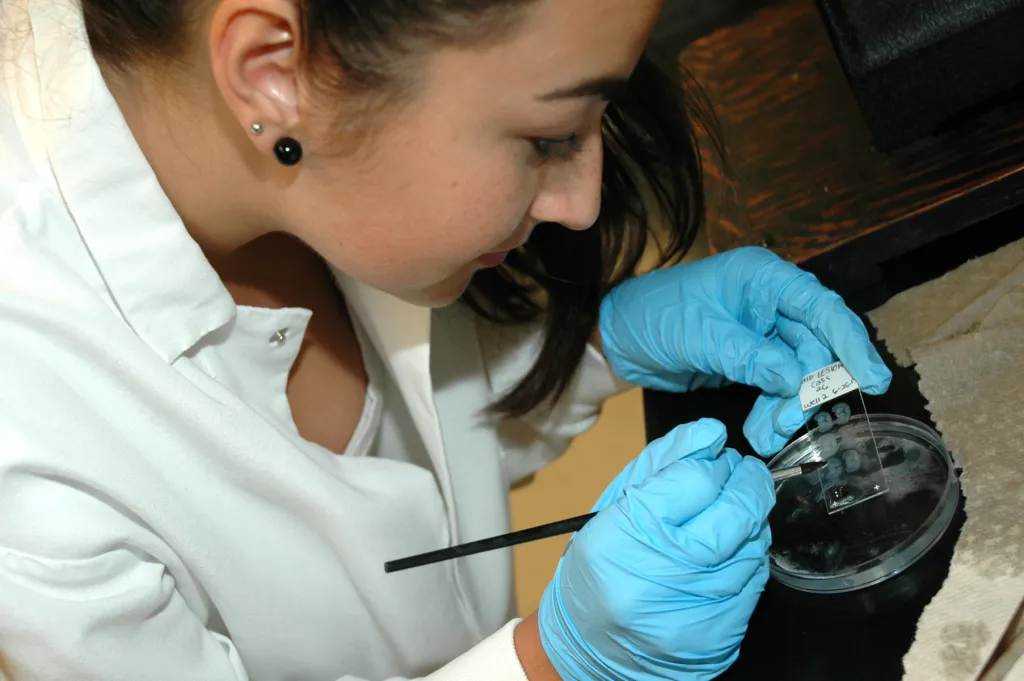
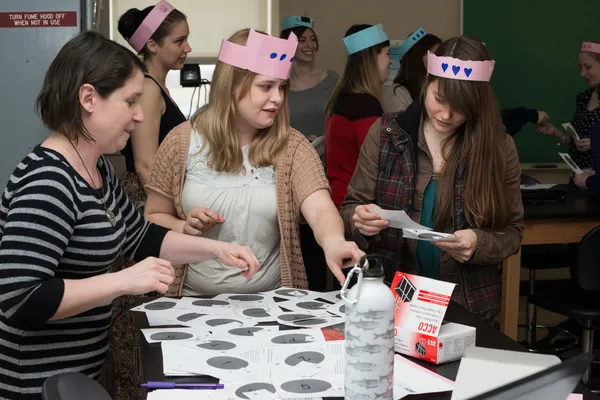
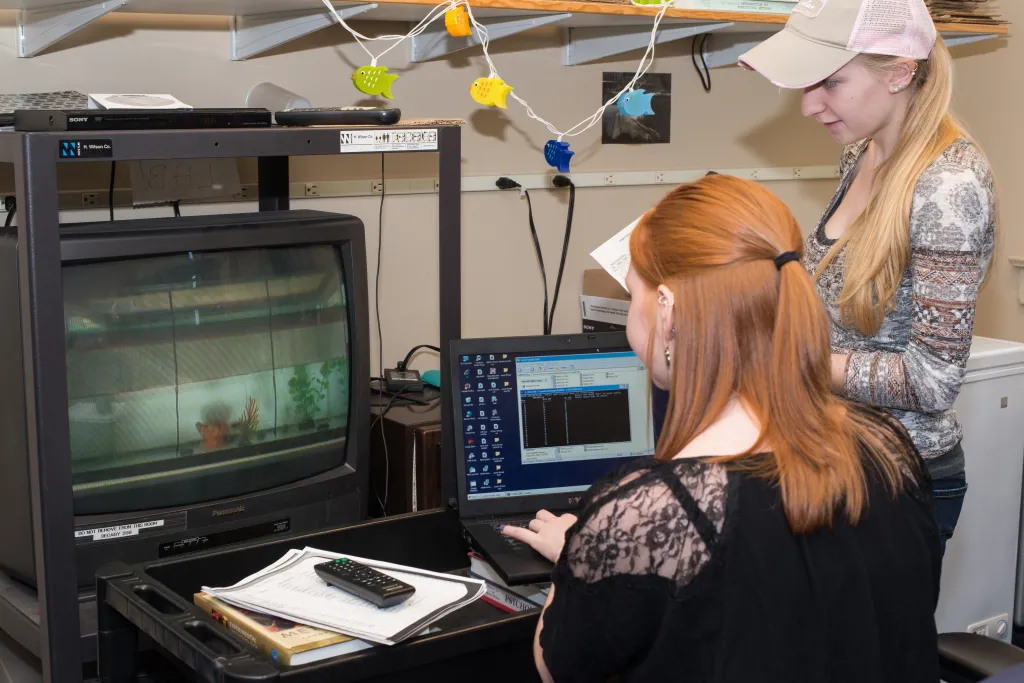
Experiential Learning in the Bachelor’s Degree in Neuroscience Program
Internships for Neuroscience Majors
Intern off campus or in one of our faculty labs that are conducting cutting-edge research. Join studies in:
- Development of anxiety and behavioral neuroscience
- Neurogentics and pain sensitization
- Headache and ocular pain
- Psychopharmacology and gut microbiome
For more information email the Academic and Career Advising Center at advising@une.edu.
Neuroscience Lab Course Learning
Get up close with UNE students in the Behavioral and Cognitive Neuroscience Lab class and watch how they study various response patterns of zebrafish.
Neuroscience Research at UNE
Can we develop new and more effective treatments for corneal pain?
Meet Professor Ian D. Meng, Ph.D., and Gillian Singer (Neuroscience ’23) as they study ocular pain by mapping out the corneal nerves.
Can We Reduce the Effects of Neonatal Trauma on the Brain?
Meet Professor Michael Burman, Ph.D., and student Skylar McComas (Neuroscience ’22) as they seek to understand the effects of neonatal trauma on the brain.
Research for Neuroscience Majors
As a Neuroscience major at UNE, you may choose to become more deeply involved in research in one of our faculty-led laboratories.
You get the opportunity to participate in research including developing new research ideas and materials, running participants, and analyzing and disseminating the results of research at conferences, and through publications in peer-reviewed journals.
A number of our faculty members have research laboratories that offer undergraduate research experiences throughout the academic year. Additionally, UNE provides an opportunity for you to apply for research funding through the SURE program to work with a faculty member on research during the summer.
We encourage you to learn more about the different opportunities available, some of these are highlighted below. If you are interested in doing research, please contact the faculty to discuss your interests.
Faculty in our Animal Behavior program are currently performing research in the following areas:
- Zach Olson, Ph.D., behavioral ecology and wildlife conservation
- Margaret Stanton, comparative social behavior, maternal behavior, and offspring development
- Mike Burman, Ph.D., negative emotionality and pain
- Glenn Stevenson, Ph.D., drug development and opioid pharmacology
- Trish Long, Ph.D., interpersonal violence, anxiety,
- Linda Morrison, Ph.D., issues in social, global awareness issues, bystander behavior
- Jennifer Stiegler-Balfour, Ph.D., memory processes underlying reading comprehension
- Julie Peterson, Ph.D., how explicit and implicit self and relationship processes influence daily life
Taking Neuroscience Beyond the Classroom
As a student in our Neuroscience program, you have the opportunity to participate in different student organizations specifically geared toward people with a passion similar to your own.
Animal Behavior Club
The Animal Behavior Club is open to all members who want to get involved with animals, learn about animals, and get the community pumped about animals.
If you are a UNE student and would like to become a member of the Psychology Club, please email msuper@une.edu.
Faculty Advisor
Zach Olson, Ph.D.
Decary Hall, Room 335
zolson@une.edu
Neuroscience Club
This student organization works with the neuroscience department to promote neuroscience as a major and promotes opportunities for you to know more about the neuroscience field. It also helps connect you with undergrad research opportunities.
If you are a UNE student and would like to become a member of the Psychology Club, contact mrice4@une.edu.
Faculty Advisor
Mike Burman, Ph.D.
Decary Hall, Room 328
mburman@une.edu
Psychology Club
The mission of the Psychology Club is to create a community of students who share a common interest in the discipline of psychology and its broad application while also providing students with connections to Psychology faculty and opportunities for social engagement.
We welcome Psychology majors and minors as well as anyone else who has an interest in Psychology. We hold regular club meetings and put on campus-wide events that engage members of the larger academic community at UNE in activities that involve psychology.
Past events have included:
- NAMI: Five Stories of Hope and Resiliency
- Relay For Life: We make a team and fundraise annually
- Annual faculty student socials
- Brain Fair
- Out of the Darkness Walk
- Save the Waves
More events are added every year.
How to Join
If you are a UNE student and would like to become a member of the Psychology Club, please contact Kana Colarossi at kcolarossi@une.edu. You are welcome to come to a meeting prior to joining, — you do not have to be a member to attend.
Faculty Advisor
Nicole McCray, Ph.D.
Decary Hall, Room 325
nmccray@une.edu
PSI CHI
Founded in 1929, PSI CHI is a member of the Association of College Honor Societies and an affiliate of both the American Psychological Association (APA) and the American Psychological Society (APS).
With the stated mission of encouraging, stimulating, and maintaining excellence in scholarship in the science of psychology, PSI CHI has grown to become one of the largest and most successful honor societies in the world with more than 1,100 chapters and 537,000 members. UNE's chapter was formed in 2010.
For more information, visit the official PSI CHI website or contact the UNE chapter's faculty advisor, Dr. Jennifer Stiegler-Balfour at jstiegler@une.edu.
Become a Member
To be eligible for membership in PSI CHI, you must:
- Be a major or minor in UNE's Department of Psychology
- Be at least a second-semester sophomore
- Have completed 9 semester hours of psychology and/or neuroscience courses
- Rank in the top 35 percent of your class in general scholarship
- Possess a minimum GPA of 3.0 (on a 4.0 scale) in both psychology and neuroscience classes and cumulatively
- Maintain a high standard of personal behavior
Resources
Announcements
APAGS/Psi Chi Junior Scientist Fellowship
The intent of the Junior Scientist Fellowship is two-fold: to provide funding for a first-year or second-year graduate-level project and to provide constructive feedback to select applicants to increase their chances of achieving success on future National Science Foundation (NSF) Graduate Research Fellowship applications.
The primary intent is to recognize outstanding research-oriented students who are entering their first year (or the first semester of their second year) of graduate study and to help them get their research off the ground. Graduate students from research-based psychology and neuroscience programs are eligible to apply.
The second intent of this fellowship is to provide written feedback to select applicants. Many students apply for the NSF Graduate Research Fellowship without ever having applied for a research fellowship. By providing feedback to select applicants, this program encourages them to strengthen their NSF graduate fellowship applications.
Funds for this $1,000 fellowship must be used to support direct research costs. These funds can be used to pay participants, purchase essential equipment or software, acquire books or instructional manuals critical to one's line of research, pay fees to publish in open-access journals, or for any other direct research cost. The funds cannot be used for indirect costs such as travel, personal computers, or class textbooks. The funds can be used for any direct research costs in a student's first year (or in the second year, if submitting in the summer prior to one's second year) of graduate school and do not need to be limited to the research discussed in the Research Essay.
Special APS Membership Offer for PSI CHI Student Members
The Association for Psychological Science is offering a reduced APS Students Membership rate for PSI CHI student members. Membership includes subscriptions to four APS journals, discount rates for the APS annual convention, and other benefits. This offer is good for new memberships only. To take advantage of this offer, use the PSI CHI promotional code PSCH at www.psychologicalscience.org/join.
Brain, Body, and Wellness Fair
UNE’s Center for Excellence in the Neurosciences created the annual Brain, Body, and Wellness Fair (formerly called the Brain Fair) to engage the community in brain exploration, with the goal of promoting interest in STEM disciplines. Students, staff, and faculty develop neuroscience-related hands-on activities and experiments for the general public.
EXPERIENCE THE BRAIN, BODY, AND WELLNESS FAIR
Apply Today
Ready to begin your future in UNE’s B.S. in Neuroscience degree program?
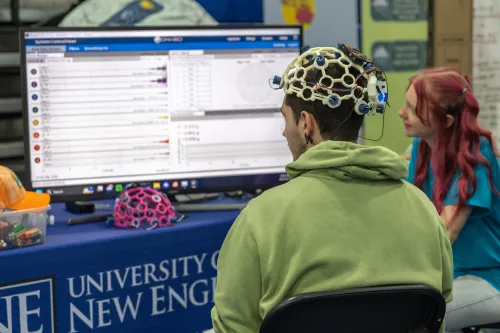
Bachelor of Science in Neuroscience FAQ
What is a neuroscience major?
Neuroscience is a rapidly expanding field that combines various disciplines such as biology, psychology, computer science, and philosophy. A neuroscience major provides an introduction to the brain, its operations, and the outcomes of issues arising from abnormal development, diseases, or injuries.
UNE offers a Bachelor of Science (B.S.) in Neuroscience degree program in Maine. UNE's Neuroscience major blends hands-on exploration, research, and internships to offer an interdisciplinary program that includes psychology, biology, chemistry, and biomedical science. Additionally, UNE offers a Minor in Neuroscience.
What can you do with a neuroscience degree?
Studying neuroscience can serve as a strong foundation for careers in medicine, psychology, or scientific research. A graduate degree is not essential for a successful career. With a degree in neuroscience, you can be eligible for numerous job opportunities including clinical research assistant, EEG technologist, health educator, laboratory technician, medical and health care manager, patient care assistant, pharmaceutical sales, regulatory affairs specialist, science writer, or editor.
Many undergraduate neuroscience majors commonly pursue advanced degrees in neuroscience or related fields such as psychology. Many of them opt for medical school to become physicians, surgeons, or psychiatrists. Others may choose careers as neuroscientists, genetic counselors, substance abuse counselors, behavioral disorder counselors, industrial-organizational psychologists, or college professors.
UNE graduates, thanks to their exceptional research experience, will stand out to both employers and graduate schools. Your strong knowledge, analytical skills, internships, and outreach service will set you on the path to success in neuroscience. Neuroscience majors at UNE may explore numerous careers, including neuroscientist (in academic, governmental, or industrial settings), physician/neurologist, neuropsychologist, consultant, scientific writer, policy advocate, and biotechnician.
UNE students can work with our Academic and Career Advising Center. It doesn’t matter if you have a clear career goal or just a general interest in a field.
How much do neuroscience majors make?
As of August 2022, the average salary for a neuroscience major in the U.S. was about $50,638, as reported by Zippia. Common salary breakdowns by job according to Indeed* include:
- Research Assistant: $45,000
- Research Scientist: $58,000
- Epidemiologist: $78,052 *
- Occupational Therapist: $84,201 *
- Neurorehabilitation Manager: $87,853 *
- Psychologist: $94,629 *
- Clinical Psychologist: $98,806 *
- Veterinarian: $105,397 *
- Nurse Practitioner: $111,094 *
- Speech Language Pathologist: $112,030 *
- Pharmacist: $117,621 *
- Neurosurgeon: $132,736 *
- Biotech Consultant: $133,731 *
- Biostatistician: $143,739 *
- Machine Learning Engineer: $149,549 *
- Neurologist: $193,281 *
Is neuroscience a STEM major?
Neuroscience falls under the STEM category. It is a rapidly growing scientific field that takes an interdisciplinary approach to exploring the brain, and nervous system, and their influence on behavior, cognition, and emotion. Neuroscience is on the U.S. Department of Homeland Security (DHS)’s STEM Designated Degree Program List. This is a complete list of fields of study that they consider to be science, technology, engineering, or mathematics (STEM) fields of study.
UNE’s Bachelor of Science (B.S.) in Neuroscience is a major in the School of Social and Behavioral Sciences. These majors tackle intricate questions about human and nonhuman behavior, thinking, social interactions, culture, and politics. Our programs use a mix of classroom learning, hands-on experiences in labs and internships, and comprehensive capstone projects to equip you for a wide range of career opportunities.
How long does it take to get a neuroscience degree?
It takes about four years for a full-time student to earn a Bachelor's degree in Neuroscience. UNE’s B.S. in Neuroscience requires a minimum of 120 credit hours. This includes:
- 42–46 credits of College of Arts and Sciences (CAS) core curriculum
- 58–72 program minimum required total credits
- Variable elective courses as needed to reach 120 credits
Learn more about UNE’s neuroscience curriculum
Once you've completed your undergraduate degree in Neuroscience, you can pursue further education by applying to graduate school, where you can work towards earning an M.S. or Ph.D. in Neuroscience or an M.D. Depending on the program, this means an additional two to six years of graduate study and an additional two to seven years of internship or residency if you want to participate in clinical work.
Is neuroscience a hard major?
The multidisciplinary nature of Neuroscience adds an element of excitement and challenge to this major, as students are required to integrate knowledge from diverse fields in order to grasp the complexities of the brain. Neuroscience involves many subjects, including biology, psychology, chemistry, physics, math, and computer science. Collaboration between these areas is crucial for understanding how the brain works.
The Neuroscience major at UNE in Maine requires a general science background, a number of courses specifically devoted to the brain and nervous system, and an in-depth experience that explores the limits of knowledge in at least one aspect of neuroscience.
A grade point average of 2.25 is necessary to be approved to add a major in Psychology, Animal Behavior, or Neuroscience, and to add a minor in Psychology, Animal Behavior, Neuroscience, Art Therapy, or Mental Health Rehabilitation Technician Certification (MHRT/C). A minimum grade of "C-" must be achieved in all courses to fulfill the Neuroscience major requirements.
UNE’s Academic and Career Advising Center will work with you to plan your curriculum and course load, find the right internship opportunity to suit your interests, and help you prepare for a career after graduation.
Is neuroscience a good major for medical school?
Yes, earning a neuroscience degree can provide you with an excellent background for medical school and a career in medicine.
At UNE, you can take part in the Pre-Med/Pre-Health Professions track of our Neuroscience undergraduate program. By choosing this track, you can complete all prerequisite coursework for graduate study in medicine, physician assistant, occupational therapy, and physical therapy.
Learn more about UNE’s Office of Pre-Health Professions Advising
Which colleges have the best neuroscience degree program for me?
Neuroscience is offered as a major at colleges and universities across the U.S., including UNE in Maine. There are many factors to consider when choosing which college or university has the best neuroscience degree program for you.
Faculty
Find the neuroscience professors whose expertise aligns with your interests, whether it's brain function, cognitive psychology, neurobiology, or related fields. Ensure their research interests and professional backgrounds are in sync with yours.
Neuroscience students at UNE receive mentorship from nationally and internationally known faculty from across UNE colleges, including our College of Osteopathic Medicine. A number of our faculty members have research laboratories that offer undergraduate research experiences throughout the academic year. Additionally, UNE provides an opportunity for you to apply for research funding through the Summer Undergraduate Research Experience (SURE) program to work with a faculty member on research during the summer:
- Animal Behavior
- Behavioral Neuroscience
- Clinical Psychology
- Cognitive Psychology
- Social Psychology
Meet faculty and professional staff in the School of Social and Behavioral Sciences
Curriculum
Assess the neuroscience program to match your preferences, examining areas like brain function, cognitive psychology, neurobiology, or related subjects, as well as opportunities for neuroscience research and internships.
The neuroscience curriculum at UNE offers students an opportunity to explore the structure and function of the nervous system. In your second two years, you may focus on cellular/molecular neurobiology, behavioral neuroscience, or cognitive science. The following are some examples of the exciting courses that you can take:
- Neuroscience Internship
- Neuroscience Research
- Introduction to Neurobiology
- Behavioral and Cognitive Neuroscience
- Neurobiology of Mental Illness
By choosing the Pre-Med/Pre-Health Professions track of the Neuroscience major, you can complete all prerequisite coursework for graduate study in medicine, physician assistant, occupational therapy, and physical therapy.
Learn more about the full Neuroscience curriculum
Career goals
Choose a neuroscience program that aligns with your career aspirations and goals. Explore the available resources to help you plan your path forward.
With this type of research experience that most undergraduates can only dream of, UNE neuroscience graduates stand out to employers and graduate schools alike. Your robust knowledge, analytical skills, internship experience, and outreach service will stand you in good stead as you embark on your journey to success in the neuroscience field.
The majority of students who graduate with a degree in Neuroscience from UNE enter graduate or professional programs culminating with careers in medicine/health care, research, and/or education. If you are interested in attending medical school, a physician assistant program, or a graduate program in occupational or physical therapy, you can major in neuroscience at UNE in Maine and fulfill all of the prerequisites for these programs.
Learn more about the Office of Pre-Health Professions Advising at UNE
Location and environment
Think about the location and surroundings that will enhance your journey as a neuroscience major.
UNE is classified as a "High Research Activity" university by Carnegie, featuring top-notch faculty and advanced resources typically found at larger institutions. However, we offer a small, close-knit New England college atmosphere, providing you with personalized attention and access to advanced equipment, usually reserved for graduate-level students.
Learn more about UNE’s campuses and how you can visit us
Students in our Neuroscience program benefit from UNE's extraordinary resources:
- Teaching classrooms – special spaces where you can learn hands-on with faculty and peers.
- Psychology labs – places where you work with psychology faculty on different projects. Some projects explore memory and reading, while others look at how our thoughts affect daily life.
- Neuroscience labs – Skilled faculty study topics concerning learning and memory, cognition and development, psychopharmacology, and drug addiction and pain.
- Animal behavior labs – You can team up with faculty for research. This could involve studying genetics, wildlife, and how chemicals affect fish behavior.
- Centers for Excellence – There are three centers at UNE that have close relations with our Neuroscience program:
As a UNE Neuroscience student, you will have the opportunity to participate in different student organizations specifically geared toward people with a passion similar to your own:
- Animal Behavior Club – open to all members who want to get involved with animals, learn about animals, and get the community pumped about animals.
- Neuroscience Club – collaborates with the neuroscience department to encourage the neuroscience major and helps you explore the field. Also, connects you to chances for research as an undergrad.
- Psychology Club – welcomes Psychology students and anyone interested in psychology. Holds regular club meetings and campus events to involve the UNE community in psychology-related activities.
- Psi Chi – the International Honor Society in Psychology, open to majors or minors in Psychology, Mental Health and Rehabilitation, Art Therapy, Animal Behavior and Neuroscience.
UNE's Center for Excellence in the Neurosciences hosts an annual Brain Fair to involve the community in exploring the brain and spark interest in STEM fields. Students, staff, and faculty create hands-on neuroscience activities and experiments for everyone to enjoy.
Watch a video of a previous UNE Brain Fair
Financial aid
Consider whether the school you're interested in provides financial aid or scholarships to support your education.
A UNE undergraduate education is very affordable. Our tuition is 16% below the average tuition for private universities in New England. Plus, all incoming full-time undergraduate students at UNE will receive Merit Scholarships in amounts from $5,000 to $22,000 per year.
Learn more about grants and scholarships available to students at UNE

